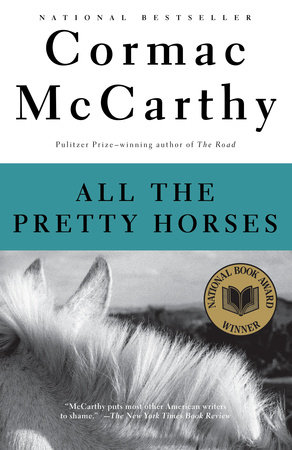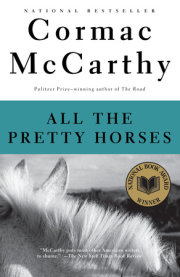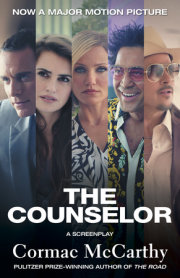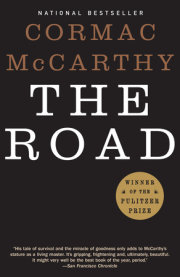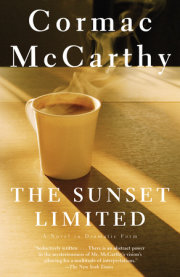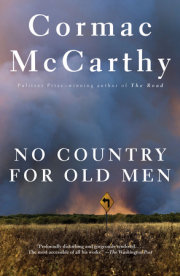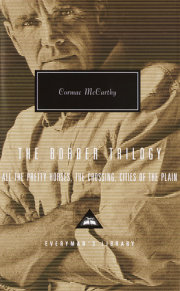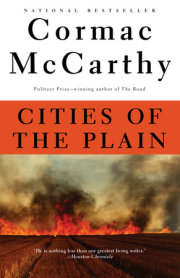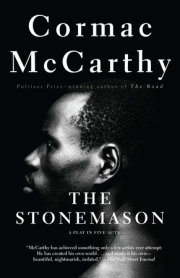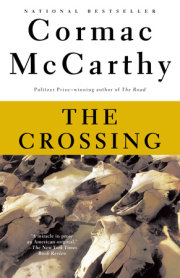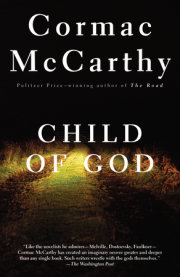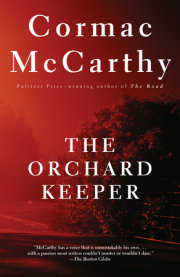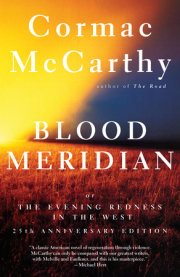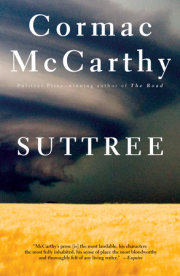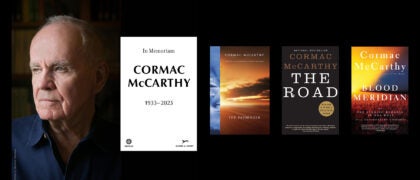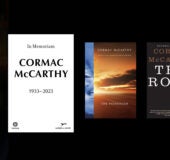The candleflame and the image of the candleflame caught in the pierglass twisted and righted when he entered the hall and again when he shut the door. He took off his hat and came slowly forward. The floorboards creaked under his boots. In his black suit he stood in the dark glass where the lilies leaned so palely from their waisted cutglass vase. Along the cold hallway behind him hung the portraits of forebears only dimly known to him all framed in glass and dimly lit above the narrow wainscotting. He looked down at the guttered candlestub. He pressed his thumbprint in the warm wax pooled on the oak veneer. Lastly he looked at the face so caved and drawn among the folds of funeral cloth, the yellowed moustache, the eyelids paper thin. That was not sleeping. That was not sleeping.
It was dark outside and cold and no wind. In the distance a calf bawled. He stood with his hat in his hand. You never combed your hair that way in your life, he said.
Inside the house there was no sound save the ticking of the mantel clock in the front room. He went out and shut the door.
Dark and cold and no wind and a thin gray reef beginning along the eastern rim of the world. He walked out on the prairie and stood holding his hat like some supplicant to the darkness over them all and he stood there for a long time.
As he turned to go he heard the train. He stopped and waited for it. He could feel it under his feet. It came boring out of the east like some ribald satellite of the coming sun howling and bellowing in the distance and the long light of the headlamp running through the tangled mesquite brakes and creating out of the night the endless fenceline down the dead straight right of way and sucking it back again wire and post mile on mile into the darkness after where the boilersmoke disbanded slowly along the faint new horizon and the sound came lagging and he stood still holding his hat in his hands in the passing groundshudder watching it till it was gone. Then he turned and went back to the house.
She looked up from the stove when he came in and looked him up and down in his suit. Buenos días, guapo, she said.
He hung the hat on a peg by the door among slickers and blanketcoats and odd pieces of tack and came to the stove and got his coffee and took it to the table. She opened the oven and drew out a pan of sweetrolls she'd made and put one on a plate and brought it over and set it in front of him together with a knife for the butter and she touched the back of his head with her hand before she returned to the stove.
I appreciate you lightin the candle, he said.
Cómo?
La candela. La vela.
No fui yo, she said.
La señora?
Claro.
Ya se levantó?
Antes que yo.
He drank the coffee. It was just grainy light outside and Arturo was coming up toward the house.
He saw his father at the funeral. Standing by himself across the little gravel path near the fence. Once he went out to the street to his car. Then he came back. A norther had blown in about midmorning and there were spits of snow in the air with blowing dust and the women sat holding on to their hats. They'd put an awning up over the gravesite but the weather was all sideways and it did no good. The canvas rattled and flapped and the preacher's words were lost in the wind. When it was over and the mourners rose to go the canvas chairs they'd been sitting on raced away tumbling among the tombstones.
In the evening he saddled his horse and rode out west from the house. The wind was much abated and it was very cold and the sun sat blood red and elliptic under the reefs of bloodred cloud before him. He rode where he would always choose to ride, out where the western fork of the old Comanche road coming down out of the Kiowa country to the north passed through the westernmost section of the ranch and you could see the faint trace of it bearing south over the low prairie that lay between the north and middle forks of the Concho River. At the hour he'd always choose when the shadows were long and the ancient road was shaped before him in the rose and canted light like a dream of the past where the painted ponies and the riders of that lost nation came down out of the north with their faces chalked and their long hair plaited and each armed for war which was their life and the women and children and women with children at their breasts all of them pledged in blood and redeemable in blood only. When the wind was in the north you could hear them, the horses and the breath of the horses and the horses' hooves that were shod in rawhide and the rattle of lances and the constant drag of the travois poles in the sand like the passing of some enormous serpent and the young boys naked on wild horses jaunty as circus riders and hazing wild horses before them and the dogs trotting with their tongues aloll and footslaves following half naked and sorely burdened an above all the low chant of their traveling song which the riders sang as they rode, nation and ghost of nation passing in a soft chorale across that mineral waste to darkness bearing lost to all history and all remembrance like a grail the sum of their secular and transitory and violent lives.
He rode with the sun coppering his face and the red wind blowing out of the west. He turned south along the old war trail and he rode out to the crest of a low rise and dismounted and dropped the reins and walked out and stood like a man come to the end of something.
There was an old horseskull in the brush and he squatted and picked it up and turned it in his hands. Frail and brittle. Bleached paper white. He squatted in the long light holding it, the comicbook teeth loose in their sockets. The joints in the cranium like a ragged welding of the bone plates. The muted run of sand in the brainbox when he turned it.
What he loved in horses was what he loved in men, the blood and the heat of the blood that ran them. All his reverence and all his fondness and all the leanings of his life were for the ardenthearted and they would always be so and never be otherwise.
He rode back in the dark. The horse quickened its step. The last of the day's light fanned slowly upon the plain behind him and withdrew again down the edges of the world in a cooling blue of shadow and dusk and chill and a few last chitterings of birds sequestered in the dark and wiry brush. He crossed the old trace again and he must turn the pony up onto the plain and homeward but the warriors would ride on in that darkness they'd become, rattling past with their stone-age tools of war in default of all substance and singing softly in blood and longing south across the plains to Mexico.
The house was built in eighteen seventy-two. Seventy-seven years later his grandfather was still the first man to die in it. What others had lain in state in that hallway had been carried there on a gate or wrapped in a wagonsheet or delivered crated up in a raw pineboard box with a teamster standing at the door with a bill of lading. The ones that came at all. For the most part they were dead by rumor. A yellowed scrap of newsprint. A letter. A telegram. The original ranch was twenty-three hundred acres out of the old Meusebach survey of the Fisher-Miller grant, the original house a oneroom hovel of sticks and wattle. That was in eighteen sixty-six. In that same year the first cattle were driven through what was still Bexar County and across the north end of the ranch and on to Fort Sumner and Denver. Five years later his great-grandfather sent six hundred steers over that same trail and with the money he built the house and by then the ranch was already eighteen thousand acres. In eighteen eighty-three they ran the first barbed wire. By eighty-six the buffalo were gone. That same winter a bad die-up. In eighty-nine Fort Concho was disbanded.
His grandfather was the oldest of eight boys and the only one to live past the age of twenty-five. They were drowned, shot, kicked by horses. They perished in fires. They seemed to fear only dying in bed. The last two were killed in Puerto Rico in eighteen ninety-eight and in that year he married and brought his bride home to the ranch and he must have walked out and stood looking at his holdings and reflected long upon the ways of God and the laws of primogeniture. Twelve years later when his wife was carried off in the influenza epidemic they still had no children. A year later he married his dead wife's older sister and a year after this the boy's mother was born and that was all the borning that there was. The Grady name was buried with that old man the day the norther blew the lawnchairs over the dead cemetery grass. The boy's name was Cole. John Grady Cole.
He met his father in the lobby of the St Angelus and they walked up Chadbourne Street to the Eagle Cafe and sat in a booth at the back. Some at the tables stopped talking when they came in. A few men nodded to his father and one said his name.
The waitress called everybody doll. She took their order and flirted with him. His father took out his cigarettes and lit one and put the pack on the table and put his Third Infantry Zippo lighter on top of it and leaned back and smoked and looked at him. He told him his uncle Ed Alison had gone up to the preacher after the funeral was said and shook his hand, the two of them standing there holding onto their hats and leaning thirty degrees into the wind like vaudeville comics while the canvas flapped and raged about them and the funeral attendants raced over the grounds after the lawnchairs, and he'd leaned into the preacher's face and screamed at him that it was a good thing they'd held the burial that morning because the way it was making up this thing could turn off into a real blow before the day was out.
His father laughed silently. Then he fell to coughing. He took a drink of water and sat smoking and shaking his head.
Buddy when he come back from up in the panhandle told me one time it quit blowin up there and all the chickens fell over.
The waitress brought their coffee. Here you go, doll, she said. I'll have your all's orders up in just a minute.
She's gone to San Antonio, the boy said.
Dont call her she.
Mama.
I know it.
They drank their coffee.
What do you aim to do?
About what?
About anything.
She can go where she wants to.
The boy watched him. You aint got no business smokin them things, he said.
His father pursed his lips and drummed his fingers on the table and looked up. When I come around askin you what I'm supposed to do you'll know you're big enough to tell me, he said.
Yessir.
You need any money?
No.
He watched the boy. You'll be all right, he said.
The waitress brought their dinner, thick china lunchplates with steak and gravy and potatoes and beans.
I'll get your all's bread.
His father tucked his napkin into his shirt.
It aint me I was worried about, the boy said. Can I say that?
His father took up his knife and cut into the steak. Yeah, he said. You can say that.
The waitress brought the basket of rolls and set it on the table and went away. They ate. His father didn't eat much. After a while he pushed the plate back with his thumb and reached and got another cigarette and tapped it against the lighter and put it in his mouth and lit it.
You can say whatever's on your mind. Hell. You can bitch at me about smokin if you want.
The boy didnt answer.
You know it aint what I wanted dont you?
Yeah. I know that.
You lookin after Rosco good?
He aint been rode.
Why dont we go Saturday.
All right.
You dont have to if you got somethin else to do.
I aint got nothin else to do.
His father smoked, he watched him.
You dont have to if you dont want to, he said.
I want to.
Can you and Arturo load and pick me up in town?
Yeah.
What time?
What time'll you be up?
I'll get up.
We'll be there at eight.
I'll be up.
The boy nodded. He ate. His father looked around. I wonder who you need to see in this place to get some coffee, he said.
He and Rawlins had unsaddled the horses and turned them out in the dark and they were lying on the saddleblankets and using the saddles for pillows. The night was cold and clear and the sparks rising from the fire raced hot and red among the stars. They could hear the trucks out on the highway and they could see the lights of the town reflected off the desert fifteen miles to the north.
What do you aim to do? Rawlins said.
I dont know. Nothin.
I dont know what you expect. Him two years oldern you. Got his own car and everthing.
There aint nothin to him. Never was.
What did she say?
She didnt say nothin. What would she say? There aint nothin to say.
Well I dont know what you expect.
I dont expect nothin.
Are you goin on Saturday?
No.
Rawlins took a cigarette out of his shirtpocket and sat up and took a coal from the fire and lit the cigarette. He sat smoking. I wouldnt let her get the best of me, he said.
He tipped the ash from the end of the cigarette against the heel of his boot.
She aint worth it. None of em are.
He didnt answer for a while. Then he said: Yes they are.
When he got back he rubbed down the horse and put him up and walked up to the house to the kitchen. Luisa had gone to bed and the house was quiet. He put his hand on the coffeepot to test it and he took down a cup and poured it and walked out and up the hallway.
He entered his grandfather's office and went to the desk and turned on the lamp and sat down in the old oak swivelchair. On the desk was a small brass calendar mounted on swivels that changed dates when you tipped it over in its stand. It still said September 13th. An ashtray. A glass paperweight. A blotter that said Palmer Feed and Supply. His mother's highschool graduation picture in a small silver frame.
The room smelled of old cigarsmoke. He leaned and turned off the little brass lamp and sat in the dark. Through the front window he could see the starlit prairie falling away to the north. The black crosses of the old telegraph poles yoked across the constellations passing east to west. His grandfather said the Comanche would cut the wires and splice them back with horsehair. He leaned back and crossed his boots on the desktop. Dry lightning to the north, forty miles distant. The clock struck eleven in the front room across the hall.
She came down the stairs and stood in the office doorway and turned on the wall switch light. She was in her robe and she stood with her arms cradled against her, her elbows in her palms. He looked at her and looked out the window again.
What are you doing? she said.
Settin.
She stood there in her robe for a long time. Then she turned and went back down the hall and up the stairs again. When he heard her door close he got up and turned off the light.
There were a few last warm days yet and in the afternoon sometimes he and his father would sit in the hotel room in the white wicker furniture with the window open and the thin crocheted curtains blowing into the room and they'd drink coffee and his father would pour a little whiskey in his own cup and sit sipping it and smoking and looking down at the street. There were oilfield scouts' cars parked along the street that looked like they'd been in a warzone.
If you had the money would you buy it? the boy said.
I had the money and I didnt.
You mean your backpay from the army?
No. Since then.
What's the most you ever won?
You dont need to know. Learn bad habits.
Why dont I bring the chessboard up some afternoon?
I aint got the patience to play.
You got the patience to play poker.
That's different.
What's different about it?
Money is what's different about it.
They sat.
There's still a lot of money in the ground out there, his father said. Number one I C Clark that come in last year was a big well.
He sipped his coffee. He reached and got his cigarettes off the table and lit one and looked at the boy and looked down at the street again. After a while he said:
I won twenty-six thousand dollars in twenty-two hours of play. There was four thousand dollars in the last pot, three of us in. Two boys from Houston. I won the hand with three natural queens.
He turned and looked at the boy. The boy sat with the cup in front of him halfway to his mouth. He turned and looked back out the window. I dont have a dime of it, he said.
What do you think I should do?
I dont think there's much you can do.
Will you talk to her?
I caint talk to her.
You could talk to her.
Last conversation we had was in San Diego California in nineteen forty-two. It aint her fault. I aint the same as I was. I'd like to think I am. But I aint.
You are inside. Inside you are.
His father coughed. He drank from his cup. Inside, he said.
They sat for a long time.
She's in a play or somethin over there.
Yeah. I know.
The boy reached and got his hat off the floor and put it on his knee. I better get back, he said.
You know I thought the world of that old man, dont you?
The boy looked out the window. Yeah, he said.
Dont go to cryin on me now.
I aint.
Well dont.
He never give up, the boy said. He was the one told me not to. He said let's not have a funeral till we got somethin to bury, if it aint nothin but his dogtags. They were fixin to give your clothes away.
His father smiled. They might as well of, he said. Only thing fit me was the boots.
He always thought you all would get back together.
Yeah, I know he did.
The boy stood and put on his hat. I better get on back, he said.
He used to get in fights over her. Even as a old man. Anybody said anything about her. If he heard about it. It wasnt even dignified.
I better get on.
Well.
He unpropped his feet from the windowsill. I'll walk down with you. I need to get the paper.
They stood in the tiled lobby while his father scanned the headlines.
How can Shirley Temple be getting divorced? he said.
He looked up. Early winter twilight in the streets. I might just get a haircut, he said.
He looked at the boy.
I know how you feel. I felt the same way.
The boy nodded. His father looked at the paper again and folded it.
The Good Book says that the meek shall inherit the earth and I expect that's probably the truth. I aint no freethinker, but I'll tell you what. I'm a long way from bein convinced that it's all that good a thing.
He looked at the boy. He took his key out of his coatpocket and handed it to him.
Go on back up there. There's somethin belongs to you in the closet.
The boy took the key. What is it? he said.
Just somethin I got for you. I was goin to give it to you at Christmas but I'm tired of walkin over it.
Yessir.
Anyway you look like you could use some cheerin up. Just leave the key at the desk when you come down.
Yessir.
I'll see you.
All right.
He rode back up in the elevator and walked down the hall and put the key in the door and walked in and went to the closet and opened it. Standing on the floor along with two pairs of boots and a pile of dirty shirts was a brand new Hamley Formfitter saddle. He picked it up by the horn and shut the closet door and carried it to the bed and swung it up and stood looking at it.
Hell fire and damnation, he said.
He left the key at the desk and swung out through the doors into the street with the saddle over his shoulder.
He walked down to South Concho Street and swung the saddle down and stood it in front of him. It was just dark and the streetlights had come on. The first vehicle along was a Model A Ford truck and it came skidding quarterwise to a halt on its mechanical brakes and the driver leaned across and rolled down the window part way and boomed at him in a whiskey voice: Throw that hull up in the bed, cowboy, and get in here.
Yessir, he said.
Copyright © 1992 by Cormac McCarthy. All rights reserved. No part of this excerpt may be reproduced or reprinted without permission in writing from the publisher.

